The content of the article
Pregnancy is a unique process during which a separate organism grows and develops inside a woman. Normally, all changes during pregnancy are physiological and do not require any special intervention. However, in practice, this is far from the case. Very often during pregnancy there are various problems - swelling, heartburn, shortness of breath, etc. Often exacerbated by chronic diseases, affect the individual characteristics of the body of the future mother. But the most common problem is the change in blood pressure. As a rule, the pressure during pregnancy decreases, since the heart is forced to work on two organisms, the load doubles.But in some cases, the pressure rises, especially if hypertension was in history before pregnancy. In this article we will try to understand why the pressure is rising, what contributes to this and how to reduce it by home ways.
Physiological changes in blood pressure
To understand whether the pressure in the body rises or falls, you need to know your working pressure. As a rule, it depends on the individual characteristics. Ideally, a woman should know the level of her pressure in a healthy state before pregnancy. This is a physiological reference point on which to rely. The mean value is the pressure of 120/90. A reduction in the normal pressure to the level of 100/70 and an increase to the level of 140/100 is allowed. Remember that an increase in pressure can be triggered by the body’s natural response to certain external factors.
- The pressure rises after exercise. During pregnancy, a quick step is enough, after which shortness of breath appears and the tonometer's indicators change.
- Excessive overwork and ingestion of fatty foods can also increase blood circulation and, as a result, increase in pressure.
- The level of blood pressure rises significantly after suffering stress.
- Some foods and caffeinated beverages may increase pressure. These are coffee, strong tea, energetic, cocoa, etc.
- Blood pressure may rise while taking certain medications.
Remember that a single measurement of blood pressure at the doctor does not say anything, indicators can be changed by various factors. To identify the average values, you need to measure the pressure in the morning for several days.
How to understand that pressure is elevated?
High blood pressure during pregnancy - risks
Increased blood pressure during pregnancy is a really dangerous condition. In the early period of hypertension can cause abnormal formation of the placental bed, which subsequently leads to spontaneous miscarriage. Even if the placenta is formed correctly, high pressure can cause hypoxia in the baby. This means that the fetus will not receive adequate nutrition, it can be born low in weight. Oxygen starvation can lead to pathologies of intrauterine development. In later periods, high blood pressure can cause edema in the lower and upper limbs of a woman. Often, hypertension in the late periods indicates gestosis of pregnant women. In the third trimester of pregnancy, high blood pressure can cause premature aging of the placenta and preterm delivery.Hypertension is dangerous not only during pregnancy, a jump in blood pressure during labor can lead to retinal detachment and even stroke.
The pressure during pregnancy does not increase in every woman, and in the risk group, first of all, mommies, who suffered from hypertension before pregnancy. Pressure is often increased in women suffering from excess weight. Kidney diseases, hormonal disruptions, cardiovascular diseases, autonomic disorders, diabetes mellitus, craniocerebral injuries in history, thyroid disorders, age over 40 - all this is a risk factor in which you need to monitor blood pressure levels constantly.
Normally, the pressure should be measured every time you visit a gynecologist in the antenatal clinic. If risk factors are present, pressure should be measured once a week and with every deterioration in well-being. It is much easier to have your own blood pressure monitor, which is always at hand. It is better to buy an electronic tonometer, since it is easier to use it, especially if you have to measure the pressure to yourself.
How to get rid of high blood pressure during pregnancy alone?
Pregnancy is a condition in which a woman must carefully monitor her health, give up bad habits, think not only about herself, but also about a small organism that develops inside. Here are some tips to help reduce blood pressure during pregnancy without the use of drugs.
- Avoid stress. It is clear that during pregnancy a woman has a lot of anxiety, they are connected with housing and financial issues, relationships with her husband, and working problems. Very often, a woman worries about the health of the future baby. Nerves do not lead to anything good and harm not only the mother, but also the child. Stress, depression, anxiety - this is one of the most frequent causes of increased pressure, such situations should be avoided. Understand that at this stage of life there is nothing more important than the health of the child. In addition, in most cases, nothing depends on your experiences, so is it worth being nervous in vain?
- Moderate amount of water. Very often, women are recommended to drink more water, this is due to different conditions. So with elevated pressure you need to drink water, but in moderation.The total amount of fluid consumed per day should not exceed 2-2.5 liters.
- Diet. Nutrition plays a huge role in maintaining blood pressure levels. To avoid its increase, it is necessary to get rid in the diet of such products as chocolate, coffee, strong black tea, fatty meat, pickles, salty and fried foods, butter, smoked products, sugar and its derivatives. At the same time, some products are able to reduce pressure, among them green tea, cranberry and lingonberry juice, fruit drink, fresh berries, any fruit. Vegetables - spinach, carrots, pumpkin, cabbage, beets reduce the pressure.
- The quality of life. Pregnancy, burdened with high pressure - is a reason to change the quality of their lives for the better. A woman should spend more time walking in the fresh air, the expectant mother needs to rest. Try to engage in acceptable types of physical activity - swimming, gymnastics for pregnant women, yoga, Pilates, etc. A cool and contrast shower can help reduce the pressure in a few minutes. It is very useful to massage the fingers - the pulling movements will help to normalize the pressure.Acupressure of the base of the skull is effective not only in the fight against pressure, but also against headaches.
- Folk remedies. Phytotherapy should not be carried away during pregnancy, but you can use reliable, safe and effective recipes of traditional medicine. Reduce blood pressure will help cranberry juice. Fresh berries are washed and squeezed out of her juice. Cake need to pour boiling water and let it brew for a couple of hours. Then filter the cake, in the resulting broth add previously obtained juice. For taste you can put honey, mint or lemon juice in the drink. Drink juice as often as possible. In the fight against high blood pressure, corn is effective - eat it steamed or boiled. To reduce the pressure by using a decoction of pumpkin and pumpkin seeds. Properly balanced diet is the basis of health and well-being, both of the woman and her baby in the womb.
Compliance with a balanced diet and adequate physical exertion will not only keep the body in good shape, but also help keep the body shape. For many women, this will be a nice bonus.
Despite the fact that pregnancy is not a disease, but a particular condition of a woman, she should carefully take care of her body.It is necessary to switch to proper nutrition, adhere to a healthy lifestyle, give up bad habits and regularly measure blood pressure. If it rises constantly and the indicators are higher than acceptable, be sure to make a cardiogram, consult a general practitioner and a cardiologist so that the doctor prescribes supportive treatment. Sometimes pressure can be a symptom of more serious diseases. Watch for changes in your body - this will help you protect your baby in the womb.
Video: what to do if a pregnant woman has high blood pressure?

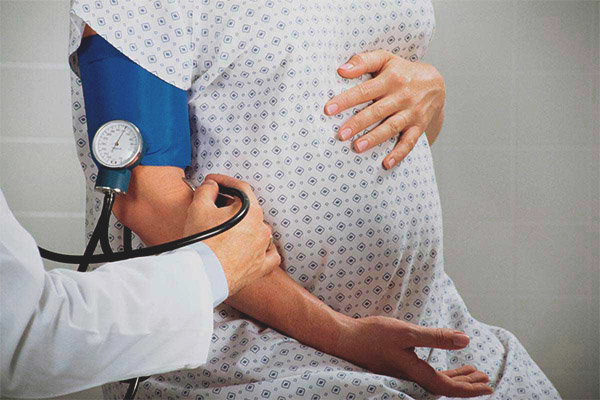



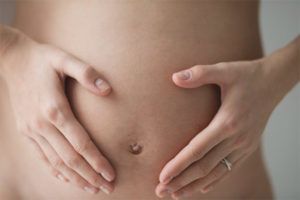

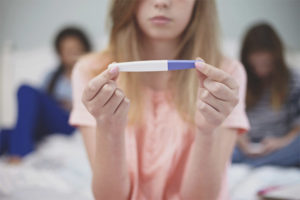
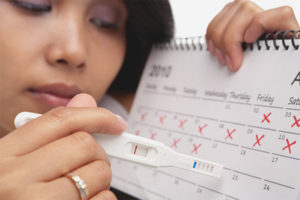
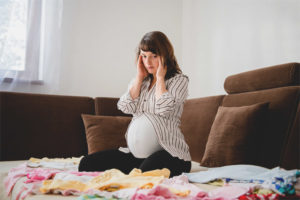

To send